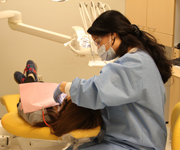contact
Megan Blackwell
Program Administrative Specialist
F 410-706-4031
Postgraduate Program in Pediatric Dentistry
 The Postgraduate Program in Pediatric Dentistry is designed to prepare the student for a career in patient care in a private practice or a hospital setting. The student is expected to develop clinical skills in treating healthy and special health care needs children, as well as to function effectively in the hospital environment treating patients with complex medical problems. This program combined with a master’s or doctorate is intended for the clinician who wishes to pursue a career as a teacher/researcher and emphasizes scientific methodology together with research experience to develop skills required for independent research. Upon successful completion of all requirements, the student is awarded a Certificate in Pediatric Dentistry and meets the advanced education eligibility requirements of the American Board of Pediatric Dentistry.
The Postgraduate Program in Pediatric Dentistry is designed to prepare the student for a career in patient care in a private practice or a hospital setting. The student is expected to develop clinical skills in treating healthy and special health care needs children, as well as to function effectively in the hospital environment treating patients with complex medical problems. This program combined with a master’s or doctorate is intended for the clinician who wishes to pursue a career as a teacher/researcher and emphasizes scientific methodology together with research experience to develop skills required for independent research. Upon successful completion of all requirements, the student is awarded a Certificate in Pediatric Dentistry and meets the advanced education eligibility requirements of the American Board of Pediatric Dentistry.
Postdoctoral students can seek simultaneous enrollment in the program combined with a master of science or doctor of philosophy degree programs. In addition to the requirements for the postdoctoral program, the successful completion of a thesis and specific course work are required for graduation. The student is awarded a certificate in pediatric dentistry and either a MS or PhD degree at the successful conclusion of the program.
Program’s Goals and Objectives
The overall goals of the Advanced Education Program of Pediatric Dentistry at the University of Maryland is to produce proficient specialist that are culturally sensitive, instilled with curiosity for lifelong learning, and are motivated to make a difference in society. In meeting the overall goal of producing a proficient specialist in Pediatric Dentistry, the specific objectives of the post graduate program which encompass the standards of established care for infants, children and adolescents include:
- To prepare residents for a career in private practice and/or academics with emphasis on advocacy and community engagement.
- To produce proficient, conscientious, evidence-based clinicians, dedicated to a lifetime of professional development and learning;
- To prepare graduates for achieving certification by American Board of Pediatric Dentistry;
- To prepare residents to participate in research, scientific writing, and case presentation.
- To provide empathetic quality care to patients
- To maintain a cost-effective postgraduate program
Program Length and Number of Positions
This is a 24-month certificate program commencing July 1 of each fiscal year. Four new positions are offered each year.
Program Type
University-based certificate with option for a master of science or doctor of philosophy.
Curriculum
The Postgraduate Program in Pediatric Dentistry is based primarily at the University of Maryland School of Dentistry on the campus of the health sciences center of the University of Maryland, Baltimore. The academic course work occupies approximately 20 percent of the postdoctoral students’ time and includes: case conferences, research methods, orthodontic diagnosis, laboratory technique, literature review, oral pathology, general anesthesia rotation, pediatrics rotation and applied teaching. Each postdoctoral student is also required to submit a research paper suitable for publication.
Facilities
- University of Maryland School of Dentistry
- University of Maryland Rehabilitation and Orthopedic Institute (James Lawrence Kernan) Hospital
- University of Maryland Medical Center
- Johns Hopkins Hospital
Program Strengths
- Strong didactic program, especially in orthodontics, with flexibility to accommodate diverse professional goals
- Evidence-based, patient-centered care in both in- and out-patient settings for healthy, special needs, and medically compromised pediatric patients
- Emphasis is placed on leadership for private practice, hospital or academic careers
- Well-qualified and diverse full- and part-time faculty
Program Stipend
Stipends are $16,788 first year and 17,610 second year.
Clinic Experience
- Orthodontics
- Conscious sedation
- Hospital rotations
- Anesthesia
- Emergency call
- Operating room
- IV/IM and oral conscious sedation
- Oral surgery
- Infant oral health
- Medically compromised
- Mentally disabled
- Craniofacial disorders
- Physically disabled
Didactic Experience
- Seminars
- Literature review
- Postgraduate level courses
- Case conferences
Research Requirement
- Thesis / data collection project
Teaching Experience
- Yes clinic half-days
- Yes lecture/presentations
Facilities
- 22 chair/operatories (Baltimore)
- 3 clinic receptionist
- 3 dental assistants (Baltimore)
- 0 dental hygienists



